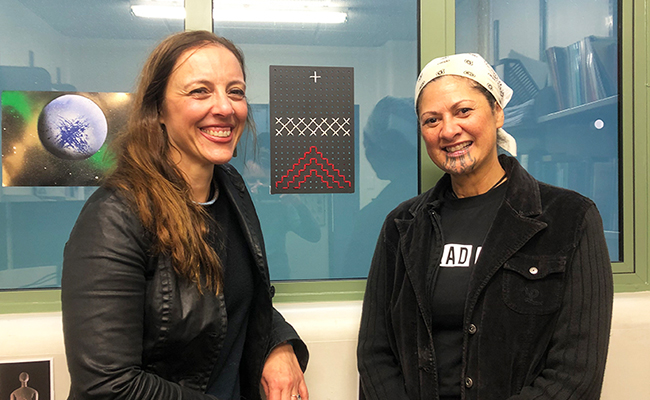
Dr Francesca Marzatico (left) with Human Rights advocate Catherine Murupaenga-Ikken (Ngāti Kuri, Te Rarawa), who recently visited the School of Surveying Te Kura Kairūri. The artwork in the background was created by SURV206 student Jay Davis as the visual component for an assignment exploring their connection with their place of origin.
Since joining the School of Surveying Te Kura Kairūri in 2019 as a lecturer in land tenure and administration, land governance expert Dr Francesca Marzatico is creating new opportunities to engage Surveying tauira with indigenous heritage and issues.
Drawing on her previous experience as an advisor to governments in conflict and post-conflict countries, involving more than 20 years enhancing governance of land and natural resources through inclusive participation, Dr Marzatico is striving to bring fresh perspectives to the teaching environment.
Dr Marzatico explains that whenua (land) is deeply connected with people's lives, and that her aim is to support students to understand and respect Māori values and issues related to Māori land and customary title.
“The simple act of drawing a boundary line on a property has the potential to disconnect people from their land, and this can have multi-generational consequences,” Dr Marzatico says.
“The surveying profession has a lot of hard-earned practical experience that can be focused on understanding and avoiding past mistakes with respect to the relationship with Māori.”
Dr Marzatico has invited two Otago Māori academics to contribute to her second-year paper SURV206, a core paper for the BSurv and BSc (Land Planning and Development) which introduces students to land tenure and property rights in New Zealand.
Andrew Rudolph (Te Rawara/Ngāpuhi), Professional Practice Fellow in Social and Community Work, lectured on the role of land as one of the pillars of the Māori health system, and Department of History Professor Angela Wanhalla (Ngāi Te Ruahikihiki, Ngāi Tahu) presented on the impact of colonial powers on Māori women's access to land, the loss of mana wahine and the role of Māori women in land protests.
Recently, Dr Marzatico invited Human Rights advocate Catherine Murupaenga-Ikken (Ngāti Kuri, Te Rarawa), who is based in Te Tai Tokerau, to contribute teaching and present a seminar for the School.
Catherine shared her experience of involvement with the Crown's Treaty of Waitangi land claim settlement negotiations for Ngāti Kuri and Te Rarawa, and says contributing to teaching at the School was a great opportunity to work directly with the students and deliver some key messages.
“Indigenous people have such a deep and layered attachment to whenua, so a better understanding of such cultural insights will help [students] to better understand clients and stakeholders,” Catherine says.
“I also wanted the students to consider that just because they're here studying Surveying, what makes them human beings in society extends beyond that identity. The wero (challenge) I laid down for them was to think outside of their professional obligations on their responsibilities as a citizen.
“Be aware and mindful, instead of mindless, in your mahi.”
While visiting the School, Catherine gave a seminar with Dr Marzatico on the climate crisis and indigenous land rights with a focus on Pacific Islands, reinforcing the message of whenua being at the core of cultural identity for Pacific people.
“What we are experiencing now are disruptions in nature's patterns and cycles which have been heavily relied on by Indigenous peoples for conducting their day-to-day activities and lives,” Catherine explains.
“These disruptions mean these populations are now operating in a period of uncertainty which is further exacerbated when their relationship with land is also under threat as a result of impacts such as sea level rise.”
Through her teaching practices, Dr Marzatico says assignments invite students to reflect on how they can engage with the material both as surveyors and individuals.
One example included students critically exploring the context and meaning of both Māori and the Pākehā names of their place of origin, or a place of their choice, in Aotearoa.
Through this assignment, Dr Marzatico's intention was for students to understand that prior to colonisation, all places of Aotearoa were inhabited by Māori.
“I encouraged the students to learn the history of their place of origin and to understand the culture of Māori that inhabited the place before European settlement in order for them to appreciate and respect Māori values.”
Dr Marzatico explains the importance for students to understand how colonial powers have affected the way that Māori live and their relationship with the land.
“For me, it's about values and respect. To show respect we have to improve our understanding of the layered relationship with land and of the values underpinning such relationships.”
Through her teaching, Dr Marzatico is hoping to contribute towards a more “culturally sensitive generation of surveyors, planners and individuals who will look at history to try to find answers to current issues”.
Dr Marzatico adds that these initiatives are her first steps towards implementation of the University's Māori Strategic Framework, and she acknowledges the support given by the School of Surveying Te Kura Kairūri and the Division of Sciences for Catherine's visit.
Associate Professor Antoni Moore, Dean of the School of Surveying Te Kura Kairūri, says that the surveying profession is not just about the science of spatial measurement.
“There's always a human component to surveying,” Associate Professor Moore says. “Francesca's teaching and research brings this aspect, particularly that of whenua and Māori, to the forefront, where it should be."
Kōrero by Guy Frederick, Sciences Communications Adviser